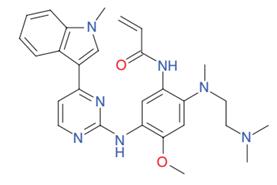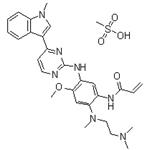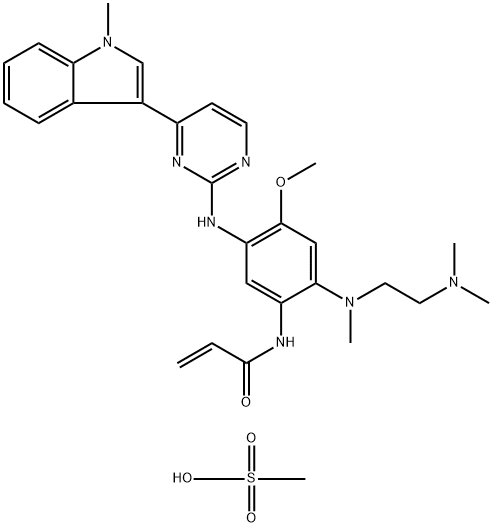Osimertinib mesylate: Mechanism of action
Being third-generation EGFR TKIs, osimertinib mesylate (AZD9291) are designed to target T790M and EGFR TKI–sensitizing mutations more selectively than wild-type EGFR. Structurally distinct from other third-generation EGFR TKIs, AZD9291 was characterized with a mono-anilino–pyrimidine. The electrophilic functionality resides on the pyrimidine C-2 substituent ring, the pyrimidine 4-substituent is C-linked and heterocyclic, and the pyrimidine 5-position is devoid of substitution.

Similar potency to early-generation TKIs was showed by AZD9291 in inhibiting EGFR phosphorylation in EGFR cells harboring sensitizing EGFR mutants. Including PC-9, H3255 (L858R), and H1650, with mean IC50 values ranged from 13 to 54 nmol/L for AZD9291.In addition to T790M, AZD9291 also potently inhibits sensitizing mutant EGFR across in vitro and in vivo disease models at similar potencies to T790M+ mutant EGFR. With mean IC50 potency less than 15 nmol/L, AZD9291 potently inhibited phosphorylation of EGFR in T790M+ mutant cell lines H1975 (L858R/T790M), PC-9VanR.
AZD9291 demonstrated good bioavailability, was widely distributed in tissues, and had moderate clearance resulting in a half-life of around 3 hours after oral dosing in the mouse. AZD9291 can induce profound shrinkage at low doses against both EGFR drug-sensitizing and T790M+ resistant EGFR-mutant disease models. Chronic long-term daily oral dosing of AZD9291 resulted in complete and durable macroscopic responses of both PC-9 and H1975 xenografts.
Preclinically, the drug potently inhibits signaling pathways and cellular growth in both EGFRm+ and EGFRm+/T790M+ mutant cell lines in vitro, with lower activity against wild-type EGFR lines, translating into profound and sustained tumor regression in EGFR-mutant tumor xenograft and transgenic models.
AZD9291 has already demonstrated proof-of-principle clinical activity in patients with acquired resistance for whom there are no approved targeted therapies. AZD9291 had a brain-to-blood ratio of up to 2 over the first 24 hours, suggesting the potential of AZD9291 to penetrate the brain.AZD9291 and its active circulating metabolite AZ5104 display similar and minimal off-target activity against other non-HER family kinases, but in vitro data suggest the potential to target both HER2 and HER4 kinase activity.
References
[1]. Cross DA, et al. AZD9291, an irreversible EGFR TKI, overcomes T790M-mediated resistance to EGFR inhibitors in lung cancer. Cancer Discov. 2014 Sep;4(9):1046-61.
[2]. Yoshimi Ohashi, et al. Targeting the Golgi apparatus to overcome acquired resistance of non-small cell lung cancer cells to EGFR tyrosine kinase inhibitors. Oncotarget. 2017 Dec 6;9(2):1641-1655.
[3]. Yasumuro O, et al. Changes in gefitinib, erlotinib, and osimertinib pharmacokinetics under various gastric pH levels following oral administration of omeprazole and vonoprazan in rats. Xenobiotica. 2017 Nov 17:1-7.
You may like
Related articles And Qustion
See also
Lastest Price from Osimertinib mesylate manufacturers

US $0.00-0.00/G2025-05-28
- CAS:
- 1421373-66-1
- Min. Order:
- 100G
- Purity:
- 99%
- Supply Ability:
- 50kgs

US $0.00/Kg/Bag2025-04-21
- CAS:
- 1421373-66-1
- Min. Order:
- 100g
- Purity:
- 99.5%min
- Supply Ability:
- 10kg



